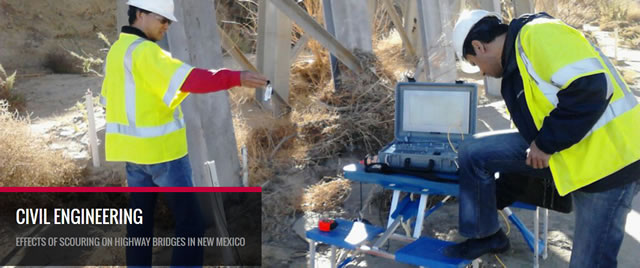
Civil Engineering ETDs
Publication Date
8-30-2011
Abstract
Reinforced concrete (RC) structures are widely used in construction. Due to aging infrastructure, increased loads, and inadequate maintenance, RC structures need to be retrofitted for prolonged lifespan and increased capacity. Traditional methods of strengthening involve the installation of fiber reinforced polymer (FRP) composites to the tension side of structures. This can be problematic in practice because of the difficulty in accessing the underside, the tension side, of the structural member. In addition, traditional strengthening techniques typically result in exposing the FRP to the external environment with possible degradation and other environmental effects. This research investigates an innovative method to strengthen concrete structures using a combination of ultra high performance concrete (UHPC) and FRP. Using this combination, FRP can be applied to the top side, compression side, of the slab. The hypothesis is that the implementation of the UHPC overlay will push the neutral axis up to the UHPC overlay, allowing the FRP to act as a tension element at ultimate conditions. Two full scale RC slabs were cast and tested to failure; the first as a control and the second using this new strengthening technique. On the strengthened slab, the FRP was installed on top of the slab, which is the compression side. A thin UHPC overlay was cast above the FRP, forming an effective composite where the UHPC resisted all of the compressive stresses and the FRP and reinforcing steel resisted the tensile stresses. The proposed strengthening system increased the ultimate load carrying capacity of the slab by 41%, the stiffness by 197%, and toughness by 167%. The relative ductility of the strengthened slab was 3.3 times greater than the control slab at service loading and 2.1 times greater than the control slab at failure. In addition, finite element models of the control and strengthened slabs were developed. The finite element models are able to accurately simulate the behavior of both slabs. A parametric study on the effect of overlay strength was also performed. It is concluded that UHPC is the compressive material of choice for this technique. The enhanced mechanical and durability characteristics of UHPC and FRP as well as the relative ease of installation makes this proposed alternative method attractive for strengthening RC structures.
Keywords
Concrete slabs--Maintenance and repair, Concrete slabs--Testing, Polymeric composites, High strength concrete.
Sponsors
Defense Threat Reduction Agency
Document Type
Thesis
Language
English
Degree Name
Civil Engineering
Level of Degree
Masters
Department Name
Civil Engineering
First Committee Member (Chair)
Maji, Arup
Second Committee Member
Gerstle, Walter
Recommended Citation
Garner, Andrew P.. "Strengthening reinforced concrete slabs using a combination of CFRP and UHPC." (2011). https://digitalrepository.unm.edu/ce_etds/54
